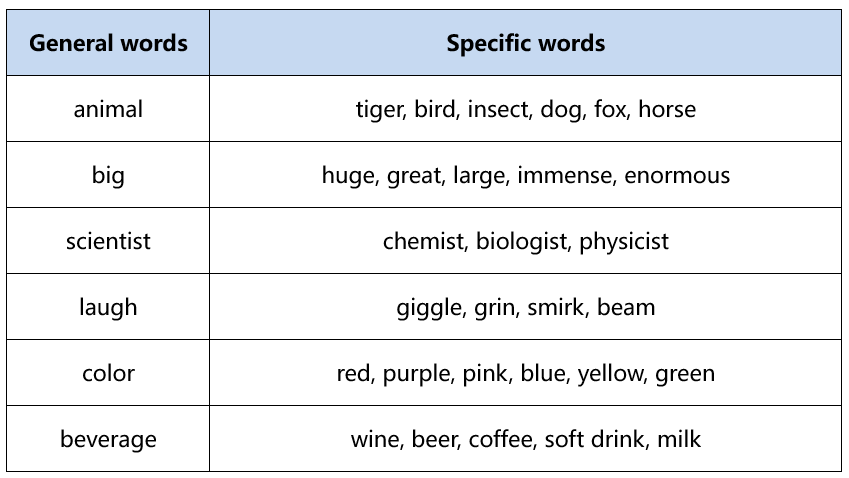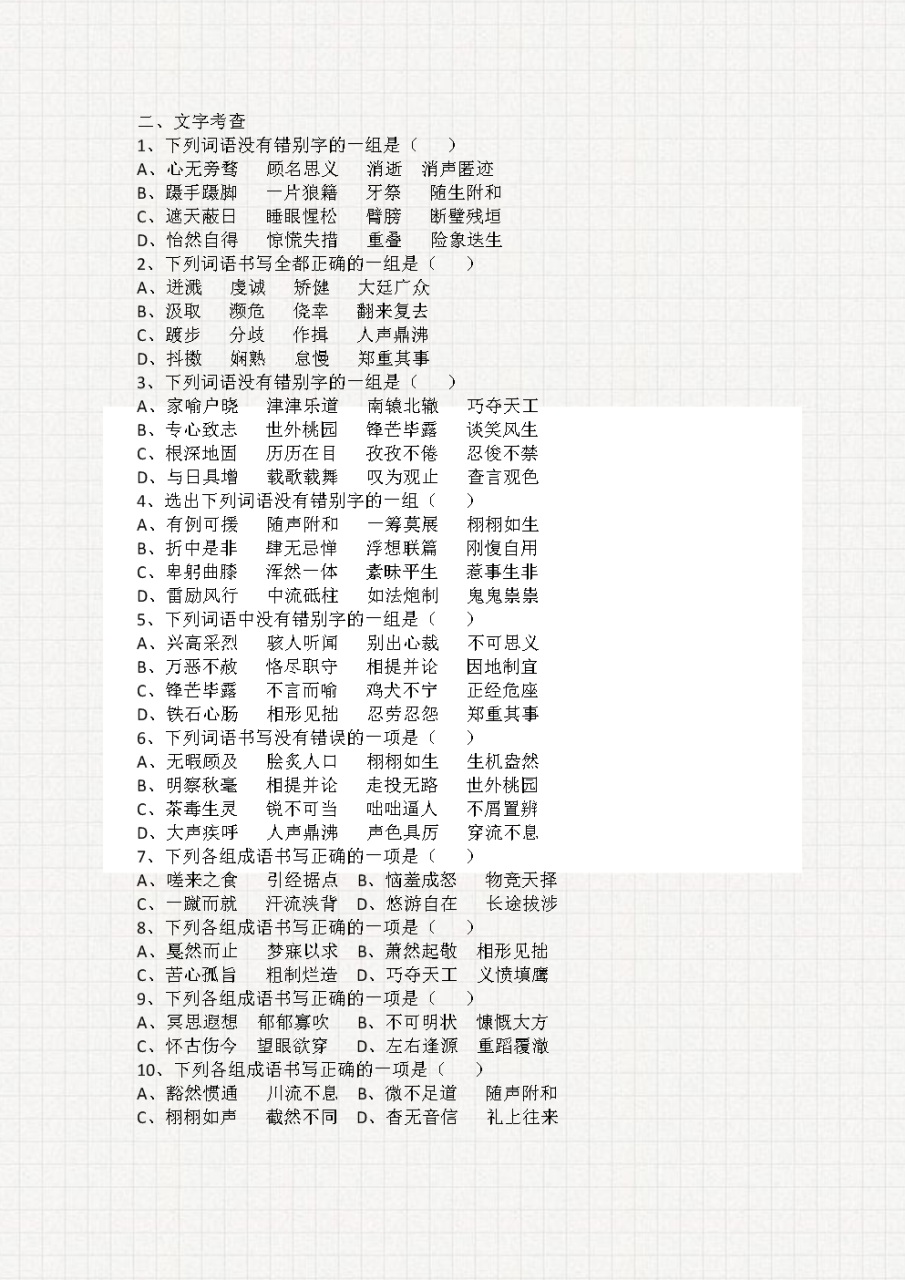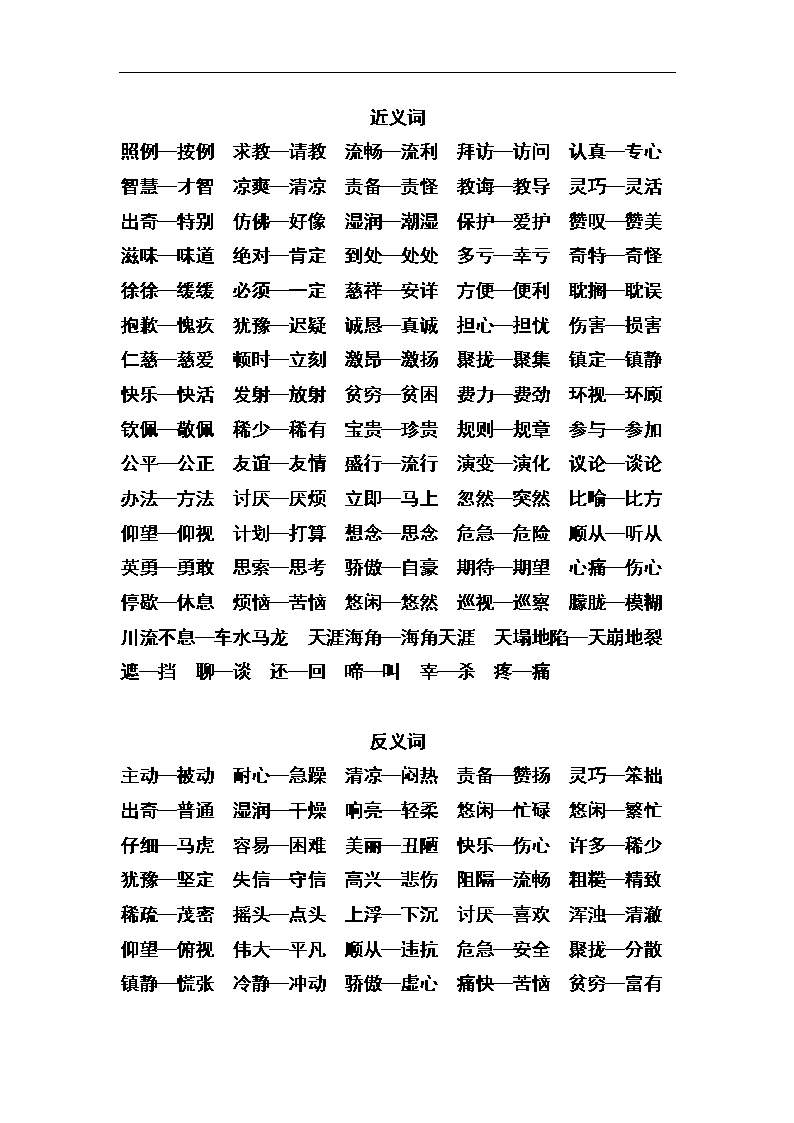
《普通高等学校招生全国统一考试大纲》中英语学科书面表达的“评分标准”,为阅卷老师评判书面表达提供了依据,也为考生了解和把握不同层次的写作要求提供了方向。在“评分标准”的要求中提到“尽力使用较高级词汇”。
什么是“高级词汇”呢?
目前没有一个固定的说法。但是小编认为“高级词”一定不是指那些难背,难用的词,再说,用了自己拿不准不会用的词,甚至会弄巧成拙,犯下错误。
其实,同学们可以从下面角度入手,让你的语篇高级起来。
01
巧妙使用熟词生义
1.strike
熟义:碰撞;击打
生义:突然想到
An awful thought has just struck me.
2. cover
熟义:遮盖;覆盖
生义:走完(一段路程)
They were hoping to cover 40 miles yesterday.
3. wear
熟义:穿戴
生义:表露,流露,面带
His face wore a welcoming smile.
4. promise
熟义:许诺
生义:使有可能,预示
The day promised to be bright and warm.
5. allow
熟义:允许
生义:使可能
Working part-time would allow me to spend more time with my family.
02
合理使用概括性词语和具体词语

在写作中往往用到概括性词语和具体性词语。

在进行描述、解释和提供细节时,尽可能使用具体性词语。在进行总结或者概括时,使用概括性词语。
General:Mr. Brown has a big house.
Specific: Mr. Brown has a two-storied house with three bedrooms, two living-rooms, a dining-room, and a kitchen.
General: I wasted a lot of time yesterday.
Specific:Yesterday morning it took me a very long time to get to work because I had got into a traffic jam.
03
辨别使用同义词和近义词
英语中有些词,比如 interesting,good等,使用频率十分高,我们写作时也会先想到这些词,所以书面表达经常出现“千人一面”的窘境。
然而,如果我们能够使用一些常用单词的同义词或近义词,就可以做到“别开生面”,给人带来清新的感觉。
如:
1. It will be very interesting. → It will be a lot of fun.
2. I turned the TV on but it went wrong. → I turned the TV on but itwent funny.

3. The little boy was so clever that he could count all the way up to 100 at one year old → The little boy was so smart that he could count all the way up to 100 at one year old.
需要注意的是,有些词意思相近,但所指的内容是有差别的:
同样表示“小”,little 暗示一种喜欢之情,而 small 是客观的。small 常用来修饰 amount, mistake, number 等,而 little 很少与这些词连用。
big,large,great 都表示“大”,其中large比big更正式一些,经常与表示数量的词连用提升同义词,如 large amount of money, a large proportion of the books;
great 通常不用来谈论具体的大小,而是表示大而令人印象深刻的事物,如 a great palace, reach a great height 等。
下面是一些例子,请注意从不同角度区别下列近义词:
1. There will be further changes in the plan. (farther / further)
further更进一步;farther 更远
2. He rose from his seat to greet the guests. (rose / raised)
rose是rise的过去式提升同义词,rise是不及物动词,rise from one’s seat 站起来
3. I raised my voice to make myself heard. (rose / raised)
raise是及物动词,raise one’s voice 提高嗓门
4. We should bear in mind all these important rules. (mind / heart)
bear in mind 记住

5. Later he found out the real cause of the fire. (find / find out)
find发现;find out 查明
6. Reforms have brought about rapid economic growth in China in recent years. (economic / economical)
economic经济的;economical 节约的
7. The speaker said at the end of his talk that questions were welcome. (questions / problems)
question表示提出的问题
8. It was so dark we almost lost sight of the lights in the distance. (sight / view)
lose sight of 看不见
9. This room can afford a good view of the sea. (sight / view)
view of the sea / the countryside 海景 / 乡村风景
10. I hope she will recover quickly from the illness. (hope / wish)
hope 后接可以实现的愿望,wish一般接虚拟语气,表示不可能实现的愿望。
04
积累同义异构表达,避免同样的词汇反复出现

1. Suddenly I hada good idea.
Suddenly I came up with a good idea.
2. Take a moment to see what is happeningaround you.
Take a moment to see what is going onaround you.
3. Everyone shoulddo his or her best.
Everyone is supposed todo his or her best.
4. Our flight was delayeddue to poor weather conditions.
We had to move to London on account ofmy job.
The game was cancelled owing to the heavy rain.
5. Inspite ofeverything, I still enjoyed the trip.
He wore a black leather jacket, despitethe heat.
—–

—–
想要本文的电子版?
一分钟即可免费领取
限 时 特 惠: 本站每日持续更新海量各大内部创业教程,加站长微信免费获取积分,会员只需38元,全站资源免费下载 点击查看详情
站 长 微 信: thumbxmw

